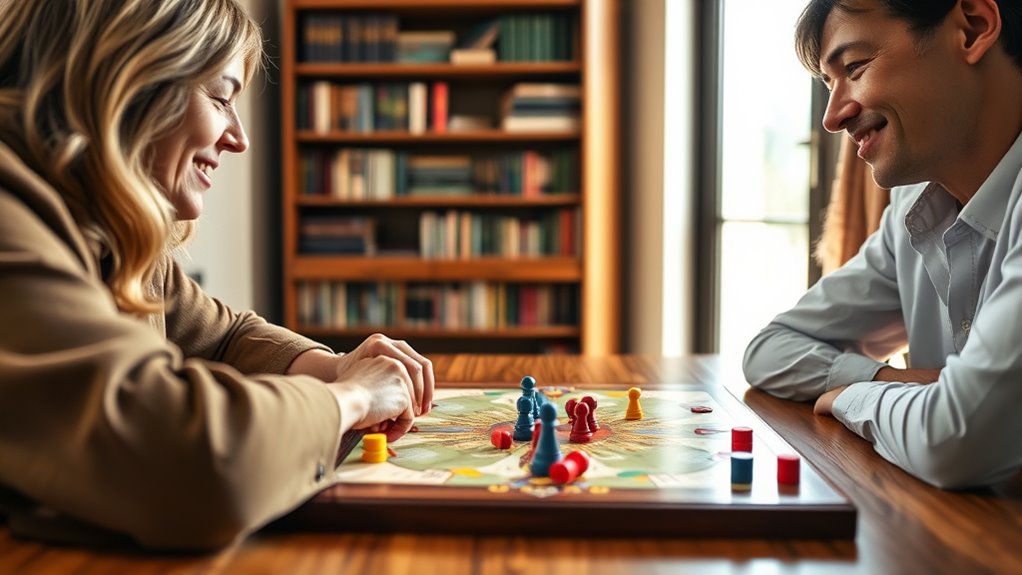In game theory, kindness fosters cooperation, leading to better outcomes for everyone involved. When you act altruistically or build trust, you encourage others to do the same, shifting interactions from conflict to collaboration. Classic scenarios like the Prisoner’s Dilemma show that cooperation often wins over self-interest, especially long-term. Embracing these principles helps strengthen markets and communities. If you keep exploring, you’ll discover how kindness can truly transform strategic relationships.
Key Takeaways
- Game theory demonstrates that kindness and altruism can promote cooperation, leading to mutually beneficial outcomes despite competitive incentives.
- Cooperative strategies, supported by trust and transparency, can override traditional self-interest models in repeated interactions.
- Moral dilemmas and social preferences influence decision-making, making kindness a strategic asset in economic and social exchanges.
- Incorporating cultural intelligence and empathy enhances cooperation across diverse communities, strengthening social capital and resilience.
- Sustainable community development benefits from trust-building, transparent communication, and aligned incentives that foster long-term cooperation.
The Foundations of Game Theory and Cooperative Strategies

Game theory provides a framework for understanding strategic interactions where each participant’s decision depends on what others choose. You analyze these interactions using payoff matrices, which map out potential outcomes based on different choices. These matrices help you see how individual incentives align or conflict, guiding strategic decisions. Cooperative strategies emerge when players form strategic alliances to maximize collective benefits. Such alliances can lead to mutually advantageous outcomes, encouraging collaboration rather than competition. Understanding these foundational concepts reveals how cooperation can be rational, even in competitive environments. By examining payoff matrices and the formation of alliances, you gain insights into when and why cooperation arises, laying the groundwork for exploring more complex scenarios where kindness influences strategic behavior. Additionally, spiritual practices like meditation and prayer can foster trust and empathy among participants, promoting cooperation in various settings. Recognizing the importance of trust-building techniques can further enhance collaborative efforts in strategic interactions. Moreover, fostering creativity within these alliances can lead to innovative solutions and strengthen collective strategies, highlighting the value of diverse approaches in cooperative game scenarios. Furthermore, the influence of WWE Raw’s financial impact illustrates how large-scale entertainment ventures can shape and motivate cooperative strategies among stakeholders, emphasizing the significance of collective effort in achieving financial success. Incorporating cultural intelligence can also help participants better understand diverse perspectives, thereby facilitating more effective cooperation in multi-cultural environments.
Classic Scenarios Demonstrating the Power of Kindness

Classic scenarios like the Prisoner’s Dilemma and the Trust Game vividly illustrate how kindness can influence strategic outcomes. In these moral dilemmas, your choice to act altruistically can shift the balance between cooperation and defection. When you prioritize kindness, you demonstrate altruistic behavior that can foster trust and improve overall results, even when personal incentives suggest otherwise. For example, in the Trust Game, mutual kindness encourages ongoing cooperation, leading to better payoffs for both parties. These scenarios highlight how moral dilemmas challenge you to weigh self-interest against the benefits of kindness. Your willingness to cooperate, driven by altruistic motives, can break traditional game-theoretic predictions and reveal the powerful role kindness plays in shaping strategic interactions. Understanding the foundational principles of sound design can also help communicate these themes more effectively through engaging auditory storytelling, especially when incorporating voiceover techniques to evoke empathy and connection. Additionally, recognizing context-specific strategies can optimize the impact of altruistic choices in various game-theoretic situations. Recognizing the importance of famous quotes about kindness can further inspire ethical decision-making and reinforce the value of empathy in strategic interactions. Furthermore, research indicates that divorce statistics can influence how individuals approach cooperation and trust in relationships, emphasizing the importance of empathy and understanding.
The Prisoner’s Dilemma: When Cooperation Wins

Have you ever wondered how cooperation can triumph even in situations where self-interest suggests otherwise? The Prisoner’s Dilemma reveals that trust building and altruistic incentives can lead to cooperation, even when individual interests seem to conflict. When both players recognize the benefits of working together, they break free from the typical trap of betrayal. Trust fosters mutual understanding, making cooperation more appealing. Altruistic incentives, like long-term gains or moral satisfaction, motivate individuals to choose collaboration over self-interest. In repeated interactions, these factors strengthen cooperation, proving that kindness and trust can shift outcomes in game theory. When players see the value in mutual support, cooperation becomes more than just an ideal—it becomes a winning strategy. Additionally, implementing effective affiliate disclosures can foster transparency and trust between creators and audiences, reinforcing cooperative relationships. Recognizing the importance of trust-building can further enhance the likelihood of sustained cooperation in various social and economic contexts. Furthermore, understanding the role of cultural norms can influence how cooperation develops across different societies, emphasizing that social context matters in game theory strategies. A solid foundation of brand trust can also encourage ongoing collaboration and positive interactions among participants. Moreover, incorporating communication strategies can facilitate clearer understanding and reduce misunderstandings that often undermine cooperation.
Real-World Applications of Cooperative Economics

Cooperative economics is increasingly shaping how communities and organizations address shared challenges. By leveraging behavioral incentives, groups motivate individuals to act in collective interest, fostering cooperation instead of competition. Social capital plays a critical role here, as trust and networks strengthen community bonds and encourage mutual help. Examples include neighborhood initiatives that promote resource sharing, local businesses adopting fair practices, and public health campaigns encouraging cooperation for societal well-being. These real-world applications show how aligning incentives and building social capital can create sustainable solutions. When cooperation is rewarded and trust is maintained, communities become more resilient and adaptable. This approach not only solves immediate problems but also nurtures long-term relationships that sustain collective progress and kindness. Incorporating principles of personal growth such as mental clarity and motivation can further enhance community cooperation and resilience. Recognizing the importance of trust-building efforts helps to solidify these cooperative frameworks and foster a sense of shared responsibility. Additionally, understanding the role of behavioral incentives can help design more effective strategies for encouraging collective action. Implementing sustainable practices can further strengthen community bonds and promote environmental responsibility. Integrating email marketing strategies, such as targeted messaging and automation, can also support these community initiatives by maintaining engagement and spreading awareness efficiently.
Building Trust and Long-Term Benefits in Markets

Building trust is essential for creating long-term benefits in markets because it encourages consistent cooperation between participants. When you focus on trust development, you foster reliable relationships that benefit all parties. Effective reputation management signals your integrity and commitment, making others more willing to engage with you. To strengthen trust and sustain cooperation, consider these key strategies:
Building trust fosters cooperation and long-term success through transparency, reliability, and open communication.
- Be transparent in your dealings, showing honesty and openness.
- Consistently deliver quality to build a strong reputation.
- Communicate openly to address concerns promptly.
- Follow through on promises, reinforcing reliability and trustworthiness.
Additionally, implementing trustworthiness measures in AI systems can further enhance confidence in automated interactions.
Frequently Asked Questions
How Does Cultural Context Influence Cooperative Behavior in Game Theory?
You might notice that cultural context shapes how people behave in game theory scenarios. Cultural norms and social expectations influence whether you choose cooperation or competition. In some cultures, collaboration is valued highly, encouraging you to work together, while others emphasize individual achievement, making you more likely to act selfishly. These differences impact strategic decisions, showing that your environment and shared values deeply affect cooperative behavior.
Are There Economic Models That Incentivize Kindness Over Competition?
You might wonder if economic models exist that favor kindness over competition. Yes, some models incorporate altruistic incentives, encouraging players to act cooperatively. These models aim to achieve cooperative equilibria, where mutual benefits surpass individual gains from competition. By designing incentives that reward kindness, you can promote cooperation, fostering stable and mutually beneficial outcomes rather than short-term competitive advantages.
What Role Does Emotional Intelligence Play in Strategic Cooperation?
Did you know that emotional intelligence accounts for nearly 60% of job performance? When it comes to strategic cooperation, emotional awareness helps you read others’ intentions more accurately, making collaboration smoother. Developing empathy enables you to build trust and respond thoughtfully, fostering long-term partnerships. Your ability to manage emotions and understand others’ feelings directly enhances cooperation, creating mutually beneficial relationships that thrive beyond immediate gains.
Can Kindness Be Quantitatively Measured in Economic Exchanges?
You wonder if kindness can be quantitatively measured in economic exchanges. While measuring altruism is complex, kindness metrics like trust levels, reciprocity rates, and willingness to cooperate offer some insights. These metrics help capture the extent of altruism and cooperative behavior, allowing you to analyze kindness’s impact on economic outcomes. Though not perfect, such measurements provide valuable data for understanding how kindness influences decision-making and resource sharing.
How Do Digital Platforms Affect Trust and Cooperation Among Participants?
Digital platforms critically influence trust and cooperation among participants. You notice that digital trust relies heavily on platform incentives, which encourage honest behavior and reputations. When these incentives align with users’ interests, cooperation flourishes. Conversely, if incentives are weak or poorly designed, trust erodes, and cooperation declines. Hence, platform incentives are essential for fostering a trustworthy environment where users feel motivated to cooperate and engage positively.
Conclusion
In the game of life, kindness acts as your guiding compass, turning the fragile seed of trust into a sturdy tree that offers shade and shelter. When you choose cooperation over confrontation, you plant roots of mutual benefit that grow stronger over time. Remember, each act of kindness is a coin in the vast economy of human connection—riches that pay dividends in trust, loyalty, and a future where everyone wins.









